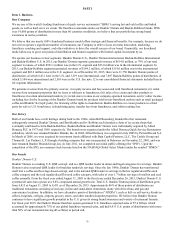Baskin Robbins 2015 Annual Report Download - page 21
Download and view the complete annual report
Please find page 21 of the 2015 Baskin Robbins annual report below. You can navigate through the pages in the report by either clicking on the pages listed below, or by using the keyword search tool below to find specific information within the annual report.-11-
Instances or reports, whether true or not, of food-safety issues, such as food-borne illnesses, food tampering, food
contamination or mislabeling, either during the growing, manufacturing, packaging, storing or preparation of products, have in
the past severely injured the reputations of companies in the quick-service restaurant sectors and could affect us as well. Any
report linking us, our franchisees or our suppliers to food-borne illnesses or food tampering, contamination, mislabeling or
other food-safety issues could damage the value of our brands immediately and severely hurt sales of our products and possibly
lead to product liability claims, litigation (including class actions) or other damages.
In addition, food safety incidents, whether or not involving our brands, could result in negative publicity for the industry or
market segments in which we operate. Increased use of social media could create and/or amplify the effects of negative
publicity. This negative publicity may reduce demand for our products and could result in a decrease in guest traffic to our
restaurants as consumers shift their preferences to our competitors or to other products or food types. A decrease in traffic as a
result of these health concerns or negative publicity could materially and adversely affect our brands, our business and our
stock price.
The quick service restaurant segment is highly competitive, and competition could lower our revenues.
The QSR segment of the restaurant industry is intensely competitive. The beverage and food products sold by our franchisees
compete directly against products sold at other QSRs, local and regional beverage and food operations, specialty beverage and
food retailers, supermarkets, and wholesale suppliers, many bearing recognized brand names and having significant customer
loyalty. In addition to the prevailing baseline level of competition, major market players in noncompeting industries may
choose to enter the restaurant industry. Key competitive factors include the number and location of restaurants, quality and
speed of service, attractiveness of facilities, effectiveness of advertising, marketing, and operational programs, price,
demographic patterns and trends, consumer preferences and spending patterns, menu diversification, health or dietary
preferences and perceptions, and new product development. Some of our competitors have substantially greater financial and
other resources than us, which may provide them with a competitive advantage. In addition, we compete within the restaurant
industry and the QSR segment not only for customers but also for qualified franchisees. We cannot guarantee the retention of
any, including the top-performing, franchisees in the future, or that we will maintain the ability to attract, retain, and motivate
sufficient numbers of franchisees of the same caliber, which could materially and adversely affect our business and operating
results. If we are unable to maintain our competitive position, we could experience lower demand for products, downward
pressure on prices, the loss of market share, and the inability to attract, or loss of, qualified franchisees, which could result in
lower franchise fees and royalty income, and materially and adversely affect our business and operating results.
If we or our franchisees or licensees are unable to protect our customers’ credit card data and other personal information,
we or our franchisees could be exposed to data loss, litigation, and liability, and our reputation could be significantly
harmed.
Data protection is increasingly demanding and the use of electronic payment methods and collection of other personal
information exposes us and our franchisees to increased risk of privacy and/or security breaches as well as other risks. In
connection with credit card transactions in-store and online, we and our franchisees collect and transmit confidential credit card
information by way of retail networks. Additionally, we collect and store personal information from individuals, including our
customers, franchisees, and employees. We rely on commercially available systems, software, tools, and monitoring to provide
security for processing, transmitting, and storing such information. The failure of these systems to operate effectively, problems
with transitioning to upgraded or replacement systems, or a breach in security of these systems, including through cyber
terrorism, could materially and adversely affect our business and operating results.
Further, the standards for systems currently used for transmission and approval of electronic payment transactions, and the
technology utilized in electronic payment themselves, all of which can put electronic payment data at risk, are determined and
controlled by the payment card industry, not by us. In addition, our employees, franchisees, contractors, or third parties with
whom we do business or to whom we outsource business operations may attempt to circumvent our security measures in order
to misappropriate such information, and may purposefully or inadvertently cause a breach involving such information. Third
parties may have the technology or know-how to breach the security of the personal information collected, stored, or
transmitted by us or our franchisees, and our respective security measures, as well as those of our technology vendors, may not
effectively prohibit others from obtaining improper access to this information. Advances in computer and software capabilities
and encryption technology, new tools, and other developments may increase the risk of such a breach. If a person is able to
circumvent our data security measures or that of third parties with whom we do business, including our franchisees, he or she
could destroy or steal valuable information or disrupt our operations. Any security breach could expose us to risks of data loss,
litigation, liability, and could seriously disrupt our operations. Any resulting negative publicity could significantly harm our
reputation and could materially and adversely affect our business and operating results.
























